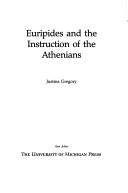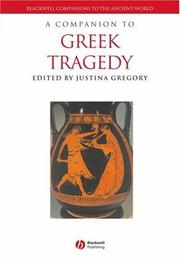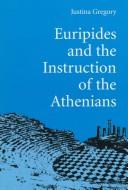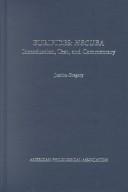| Listing 1 - 10 of 10 |
Sort by
|

ISBN: 0472102303 Year: 1991 Publisher: Ann Arbor, MI : University of Michigan Press,
Abstract | Keywords | Export | Availability | Bookmark
 Loading...
Loading...Choose an application
- Reference Manager
- EndNote
- RefWorks (Direct export to RefWorks)
Didactic drama, Greek --- Mythology, Greek, in literature. --- Political plays, Greek --- Tragedy. --- History and criticism. --- -Political plays, Greek --- Greek political plays --- Greek didactic drama --- Mythology, Greek, in literature --- Tragedy --- Drama --- Greek drama --- History and criticism --- Euripides --- Criticism and interpretation. --- Athens (Greece) --- Intellectual life. --- Ėvripid --- Yūrībīdīs --- Euripide --- Euripedes --- Eŭripido --- Eurypides --- Euripidesu --- אוריפידס --- エウリーピデース --- Εὐριπίδης

ISBN: 1405107707 9781405107709 1405175494 0470996676 9786610285914 140516588X 0470795832 1782685901 1280285915 1405152052 Year: 2006 Publisher: Malden (Mass.) : Blackwell,
Abstract | Keywords | Export | Availability | Bookmark
 Loading...
Loading...Choose an application
- Reference Manager
- EndNote
- RefWorks (Direct export to RefWorks)
A Companion to Greek Tragedy provides readers with a fundamental grounding in Greek tragedy and also introduces them to the various methodologies and the lively critical dialogue that characterize the study of Greek tragedy today." "The volume comprises 31 essays written by an international cohort of scholars. The essays are organized into four sections. The opening section on Contexts surveys Greek tragedy's historical, religious, political, and artistic background. A section on Elements follows, examining the genre's structural components. A section on Approaches presents a series of essays exemplifying particular lines of enquiry; and the final section on Reception traces the interpretative tradition from ancient to modern times." "Throughout the volume, all ancient Greek is transliterated and translated, and technical terms are explained as they appear, making the Companion accessible to those without detailed knowledge of the language or the genre.

ISBN: 1283011638 9786613011633 0472027700 9780472027705 0472084437 9780472084432 0472102303 9780472102303 0472102303 Year: 1997 Publisher: Ann Arbor University of Michigan Press
Abstract | Keywords | Export | Availability | Bookmark
 Loading...
Loading...Choose an application
- Reference Manager
- EndNote
- RefWorks (Direct export to RefWorks)
Didactic drama, Greek --- Greek drama (Tragedy) --- Political plays, Greek --- Greek didactic drama --- Greek drama --- History and criticism. --- Euripides --- Ėvripid --- Yūrībīdīs --- Euripide --- Euripedes --- Eŭripido --- Eurypides --- Euripidesu --- אוריפידס --- エウリーピデース --- Εὐριπίδης --- Criticism and interpretation. --- Athens (Greece) --- Intellectual life.
Book
ISBN: 9780190857899 9780190857882 Year: 2018 Publisher: New York Oxford University Press
Abstract | Keywords | Export | Availability | Bookmark
 Loading...
Loading...Choose an application
- Reference Manager
- EndNote
- RefWorks (Direct export to RefWorks)
This book studies the social and ethical formation of youthful figures in Homer, Sophocles, and Euripides. Every fictional character comes with a past attached, a presumed personal history that is both implicit and explicit; for the youthful heroes and heroines of epic and tragedy, early education figures significantly in that past. Cheiron's Way takes as its point of departure the words of Homer's Phoenix to Achilles, who claims, "I made you the man you are" as he pleads with his former pupil to let go of his anger.The book begins by exploring topics relevant to heroic and tragic education: age classes, rites of passage, verbal modes of instruction, social conditioning, mentoring, peer role models, and the controversial balance between nature and nurture. It introduces the first teacher in the Greek tradition, Cheiron the centaur, who founded a school for young heroes in his Thessalian cave and instructed Achilles, Jason, and others with mixed success. Next it turns to the Iliadic Achilles, who achieves maturity by way of successive crises-a crisis of disillusionment with the assumptions that shaped his heroic education, followed by a crisis of empathy for his adversary-and who becomes an influential prototype for tragedy. Examination of the Odyssey suggests that while Odysseus received a normative heroic upbringing and Nausicaa internalizes social expectations for young women, Telemachus is more of an outlier. In tragic representations of education Sophocles' Ajax and Neoptolemus replicate the Achillean pattern only partially and unsuccessfully, as does Euripides' Hippolytus; only Achilles and Iphigenia in Euripides' Iphigenia in Aulis achieve an emotional maturity commensurate with the Iliadic Achilles'. Yet all these texts confirm, as elegantly argued in this book, the perennial lure, despite uncertain results, of the educational enterprise for communities, students, and teachers.
Education in literature --- Centaurs in literature --- Greek literature --- Greek drama (Tragedy) --- History and criticism --- Homer --- Characters.
Book
ISBN: 9781405175494 Year: 2008 Publisher: Malden, MA : Blackwell Pub.,
Abstract | Keywords | Export | Availability | Bookmark
 Loading...
Loading...Choose an application
- Reference Manager
- EndNote
- RefWorks (Direct export to RefWorks)

ISBN: 0788506129 Year: 1999 Publisher: Atlanta Scholars Press
Abstract | Keywords | Export | Availability | Bookmark
 Loading...
Loading...Choose an application
- Reference Manager
- EndNote
- RefWorks (Direct export to RefWorks)
Hecuba (Legendary character) in literature --- Hecuba (Legendary character) --- Trojan War --- Trojan War --- Literature and the war --- Euripides.
Periodical
Abstract | Keywords | Export | Availability | Bookmark
 Loading...
Loading...Choose an application
- Reference Manager
- EndNote
- RefWorks (Direct export to RefWorks)
Book

ISBN: 9783110690019 3110690012 9783110695625 3110695626 Year: 2020 Publisher: Berlin Boston
Abstract | Keywords | Export | Availability | Bookmark
 Loading...
Loading...Choose an application
- Reference Manager
- EndNote
- RefWorks (Direct export to RefWorks)
The volume offers new insights into the intricate theme of silence in Greek literature, especially drama. Even though the topic has received respectable attention in recent years, it still lends itself to further inquiry, which embraces silence's very essence and boundaries; its applications and effects in particular texts or genres; and some of its technical features and qualities. The particular topics discussed extend to all these three areas of inquiry, by looking into: silence's possible role in the performance of epic and lyric; its impact on the workings of praise-poetry; its distinct deployments in our five complete ancient novels; Aristophanic, comic and otherwise, silences; the vocabulary of the unspeakable in tragedy; the connections of tragic silence to power, authority, resistance, and motivation; female tragic silences and their transcendence, against the background of male oppression or domination; famous tragic silences as expressions of the ritualized isolation of the individual from both human and divine society. The emerging insights are valuable for the broader interpretation of the relevant texts, as well as for the fuller understanding of central values and practices of the society that created them.
Greek literature --- Silence in literature. --- Criticism, interpretation, etc. --- Greek literature. --- History and criticism --- E-books
Book

ISBN: 1942495684 Year: 2023 Publisher: Sicily, Siracusa : Parnassos Press – Fonte Aretusa
Abstract | Keywords | Export | Availability | Bookmark
 Loading...
Loading...Choose an application
- Reference Manager
- EndNote
- RefWorks (Direct export to RefWorks)
In ancient Greek and Roman culture, theatrical performances served as a school in which communities engaged emotionally and intellectually with ethical, political, and cultural controversies. This volume brings together scholars from a range of disciplines who offer a variety of perspectives on the educational uses of the theater from archaic Sicily to Imperial Rome. Evidence from archaeology, epigraphy, iconography, history, philosophy, and of course, drama is brought to bear on the question of the many ways that theater functioned as an instrument of paideia in Greco-Roman antiquity.
Drama --- Literature --- Literary criticism
Book

ISBN: 3110518961 311051978X 9783110519785 3110514915 9783110514919 9783110519792 3110519798 Year: 2017 Publisher: Berlin Boston
Abstract | Keywords | Export | Availability | Bookmark
 Loading...
Loading...Choose an application
- Reference Manager
- EndNote
- RefWorks (Direct export to RefWorks)
This collection of essays, published in honour of Professor Georgia Xanthakis-Karamanos, addresses topics which lie at the forefront of current research on the fields of Greek drama and classical reception studies. It brings together internationally distinguished scholars who provide fresh insights into issues pertaining to the origins of Greek tragedy and comedy, their generic identity, the structure, the morality or the divine and human characters emerging from individual plays, the presence of Greek drama outside Athens in post-classical times, the associations between drama and genres such as epic and oratory or even the reception of Greek drama in operatic works such as Wagner’s Tristan und Isolde. Related art forms, such as music, receive particular attention. Focusing on either broader topics or specific texts, the essays of this volume provide a wide range of theoretical perspectives often combining modern critical trends such as reception studies, narratology or cultural studies with close and acute readings of individual passages. The volume is of particular interest to scholars and students of Greek drama and its reception as well as to anyone interested in Greek culture and its various manifestations.
Greek drama --- History and criticism. --- Greek drama. --- Griechisch. --- Komödie. --- Tragödie. --- Comedy. --- reception. --- tragedy.
| Listing 1 - 10 of 10 |
Sort by
|

 Search
Search Feedback
Feedback About UniCat
About UniCat  Help
Help News
News